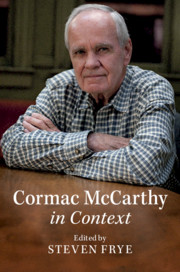Book contents
- Cormac McCarthy in Context
- Cormac McCarthy in Context
- Copyright page
- Contents
- Contributors
- Acknowledgments
- Chronology
- Part I Environments
- Part II Literary Contexts: Sources, Influences, Allusions
- Part III Intellectual Contexts
- Part IV Social and Cultural Contexts
- Chapter 18 North American Politics
- Chapter 19 Race and Cultural Difference
- Chapter 20 Ecology
- Chapter 21 Modernity
- Chapter 22 A Visual Artist and McCarthy
- Chapter 23 Cinematic Adaptations
- Chapter 24 Cinematic Influences
- Part V Archives, Critical History, Translation
- Works Cited
- Index
Chapter 20 - Ecology
from Part IV - Social and Cultural Contexts
Published online by Cambridge University Press: 12 December 2019
- Cormac McCarthy in Context
- Cormac McCarthy in Context
- Copyright page
- Contents
- Contributors
- Acknowledgments
- Chronology
- Part I Environments
- Part II Literary Contexts: Sources, Influences, Allusions
- Part III Intellectual Contexts
- Part IV Social and Cultural Contexts
- Chapter 18 North American Politics
- Chapter 19 Race and Cultural Difference
- Chapter 20 Ecology
- Chapter 21 Modernity
- Chapter 22 A Visual Artist and McCarthy
- Chapter 23 Cinematic Adaptations
- Chapter 24 Cinematic Influences
- Part V Archives, Critical History, Translation
- Works Cited
- Index
Summary
Throughout his career, Cormac McCarthy has produced a rich body of literature that examines the complicated and often fraught interactions between humans and the more-than-human world. Encompassing tales about precarity and abandonment, failures of the Western dream to provide new beginnings and new freedoms, philosophical meditations on the limits of human knowledge, and apocalyptic revisions of agency in end times, McCarthy’s writings examine complex entanglements between human and nonhuman characters in an ever-changing material world. His place-based writings reconfigure spatial categories as they unfold across diverse geographical scales that are local, regional, national, transnational, and at times even planetary. Drawing on new developments in materialist ecocriticism and the environmental humanities, this chapter explores how the author engages intersections between economy and ecology; addresses agency across humans, animals, and the more-than-human world; and examines challenges posed by the Anthropocene. Through its depictions of ecology and agriculture, the role of the written word in the conquest of the Americas, and the Great Acceleration resulting from the Cold War global arms race, McCarthy’s writings help readers assess some of the more baffling complexities of our new geologic age.
Keywords
Information
- Type
- Chapter
- Information
- Cormac McCarthy in Context , pp. 216 - 226Publisher: Cambridge University PressPrint publication year: 2020
Accessibility standard: Unknown
Why this information is here
This section outlines the accessibility features of this content - including support for screen readers, full keyboard navigation and high-contrast display options. This may not be relevant for you.Accessibility Information
- 1
- Cited by
